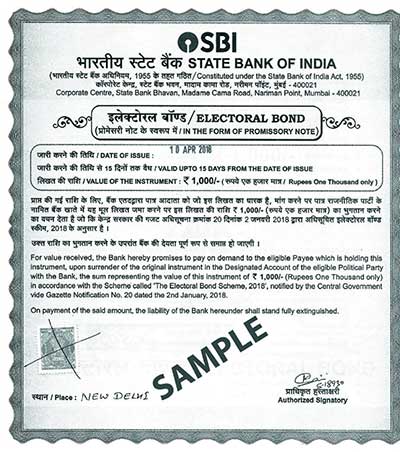19/11/2022
Relevance: GS-2: Powers, functions and responsibilities of various Constitutional Bodies. Important aspects of governance, transparency and accountability.
Key Phrases: Electoral Bond, institutionalized corruption, information asymmetry, membership-funded parties, Salient features of electoral bonds.
Context:
- The discussion about the Electoral Bonds and their efficacy is not new in India. The issues raised with respect to corruption and its institutionalization are gaining significant responses at present.
Background
- The discourse around political finance in India usually revolves around the issue of corruption e.g. political contestation over the introduction of electoral bonds.
- It is either presented as a pious instrument for ‘cleansing’ politics, by routing funding through legal channels, or as a murky mechanism for legitimating ‘institutionalized corruption’.
- The corruption frame locks the issue of political funding into a superficial binary of ‘clean’ versus ‘dirty’, expressed in moral or legal terms.
- This framing precludes any focus on the structural relationship between the nature of political funding and the shape of our political system.
- Corruption is merely one symptom of this structural relationship, rather than being a driving factor.
How it plays a pivotal role
- In any country, the nature of political finance is an important determinant of the structure of political competition.
- The structure of political competition can be studied around three axes:
- Institutional: the regulation of competition between ruling and Opposition parties;
- Organizational: the regulation of competition within a party; and
- Ideological: the role of ideas in determining competition between parties.
- All the three axes of political competition are substantially influenced by the nature of political finance.
The degree of transparency of political funding
- It informs the efficacy of institutional safeguards e.g. the inherent opacity of electoral bonds renders the power of the Election Commission of India (ECI) irrelevant in terms of ensuring a level-playing field.
- Meanwhile, the information asymmetry between the ruling and the Opposition parties gnaws at the fairness of electoral processes.
Centralization of political funding
- The extent to which political funding is centralized within a party determines whether power in the party is drawn from organizational structures or exercised in a personalistic manner.
- For example, membership-funded parties such as the DMK and the BSP of an earlier era were highly organized parties where leaders wielded power in a responsive, programmatic manner.
The ideological basis of political competition
- The political financing regime also shapes the role of ideas in grounding political competition.
- When political finance is anchored to a narrow concentration of economic capital, the ideological basis of political competition tends to become severely corroded.
Electoral Bonds
- The government of India introduced it with the Finance Bill 2017.
- The Electoral bonds are instruments/securities that are used to donate funds to political parties.
- These bonds are on the lines of bearer bonds or promissory notes wherein the issuer (bank) is the custodian and pays the one who holds the bonds (political party).
- Electoral bonds are purchased anonymously by donors and are valid for 15 days from the date of issue. State Bank of India is authorized to issue and encash these bonds.
- As debt instruments, these can be bought by donors from a bank, and the political party can then encash them.
- These can be redeemed only by an eligible party by depositing the same in its designated account maintained with a bank.
- The bonds are issued by SBI in denominations of Rs 1,000, Rs 10,000, Rs 1 lakh, Rs 10 lakh and Rs 1 crore.
Bonds as advantage to ruling party
- Having constructed this framework of analysis, let us come back to the issue of electoral bonds.
- How do we expect the rise of electoral bonds, as a major source of political finance, to affect the prevailing patterns of political competition?
- At the outset, one must note the remarkable speed with which
electoral bonds have colonized at least the declared sphere of political
funding.
- Within two years of its introduction, electoral bonds have covered half of the total income of national and regional parties, according to the Association for Democratic Reforms (ADR).
Salient features of electoral bonds
- The design of electoral bonds: perhaps more than any other instrument of political finance, it leans to the advantage of the ruling party. The ruling party got over 75% of the total electoral bonds sold according to ECI data.
- As per the political scientists, electoral bonds invert the concept of transparency and openness in political funding, whereby only the government, and presumably the ruling party, have access to the transaction trails.
- The information asymmetry and barriers to institutional scrutiny thus created considerably skews the channel of electoral bonds towards the ruling party.
- Electoral bonds centralize political funding towards the national units of political parties, further entrenching the leverage of national leadership over the State and local units. As per RTI response, 80% of the bonds sold in 2018-19 were redeemed in Delhi.
- Electoral bonds were introduced alongside significant legal amendments, such as the removal of erstwhile limits (7.5% of net profit) on corporate donations.
- These changes in the legal architecture of political finance enable the prospects of an alliance of national political elite and big business conglomerates squeezing the space for both local elites and regional capital.
Way Forward
- To be sure, the new political financing regime only builds on the political pathologies already prevalent in our system rather than creating them from scratch.
- Even so, it is important that independent institutions such as the ECI and the Supreme Court of India step in to layer the seeming black hole of electoral bonds with a minimum level of institutional safeguards.
- Lest this “reform” of political finance goes down in history as a significant marker in our story of democratic decline.
Source: The Hindu
Mains Question:
Q. Critically analyze the potential of electoral bonds in fulfilling the goal of transparency in political fundraising. (150 Words)








